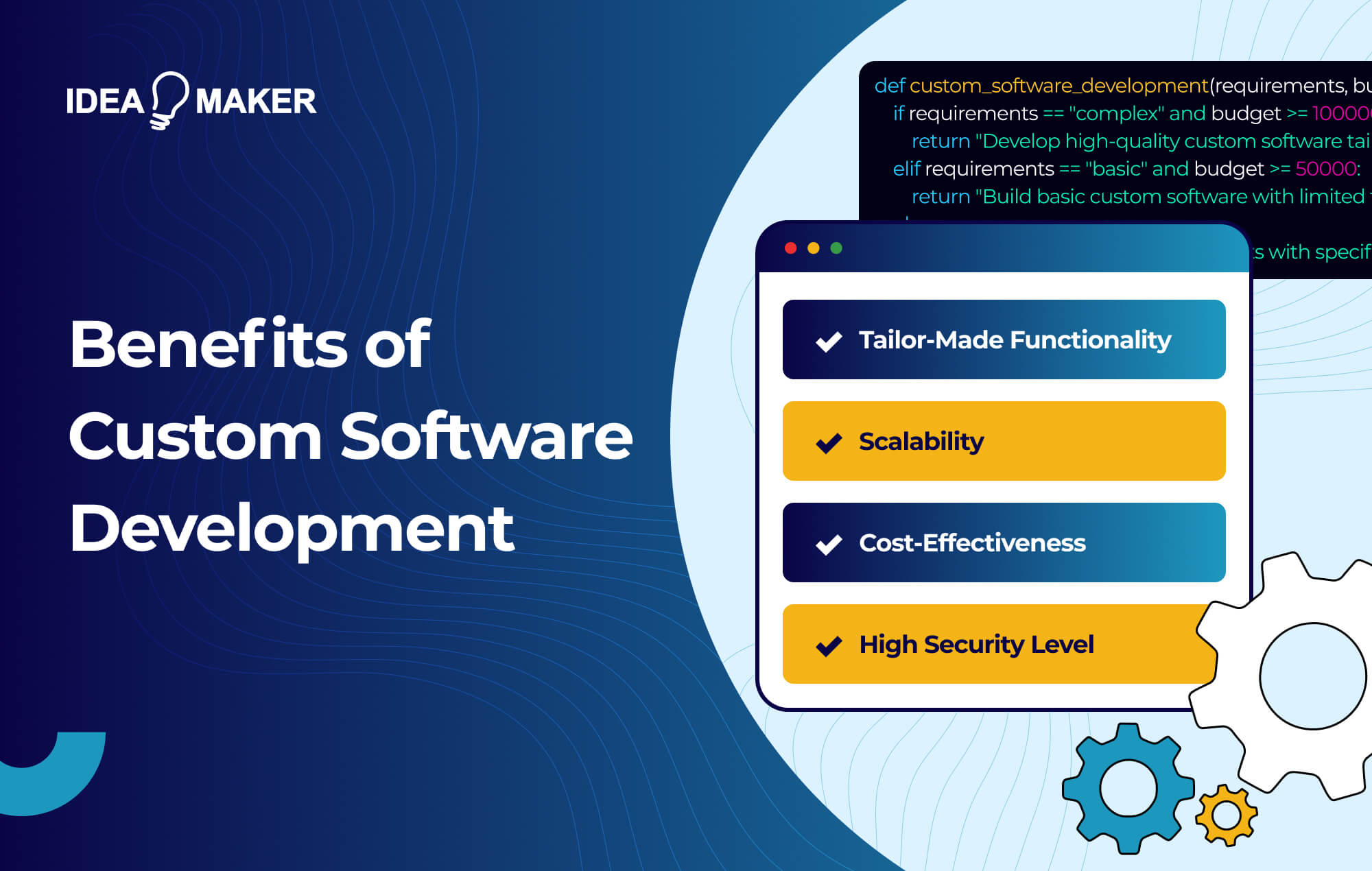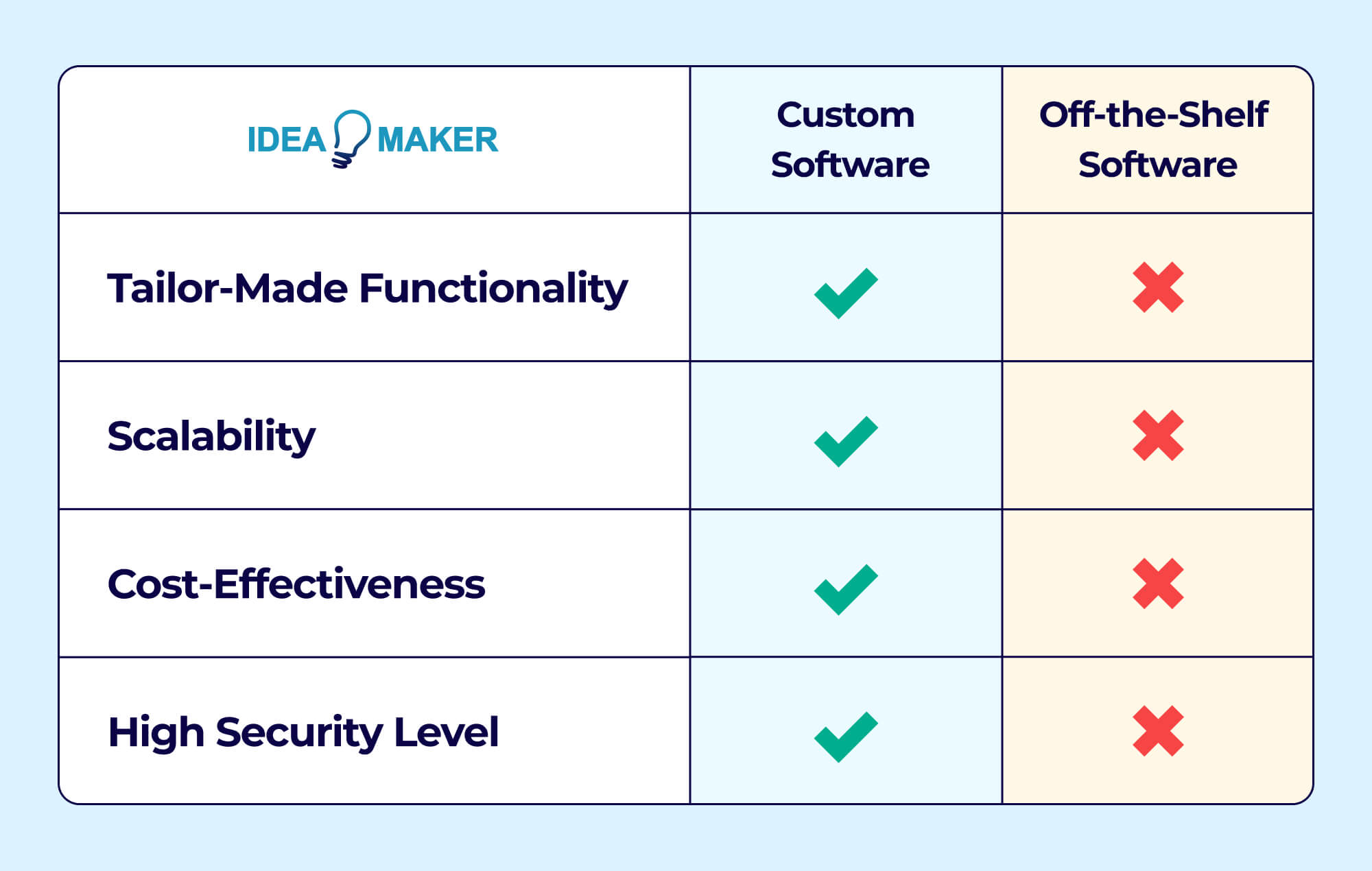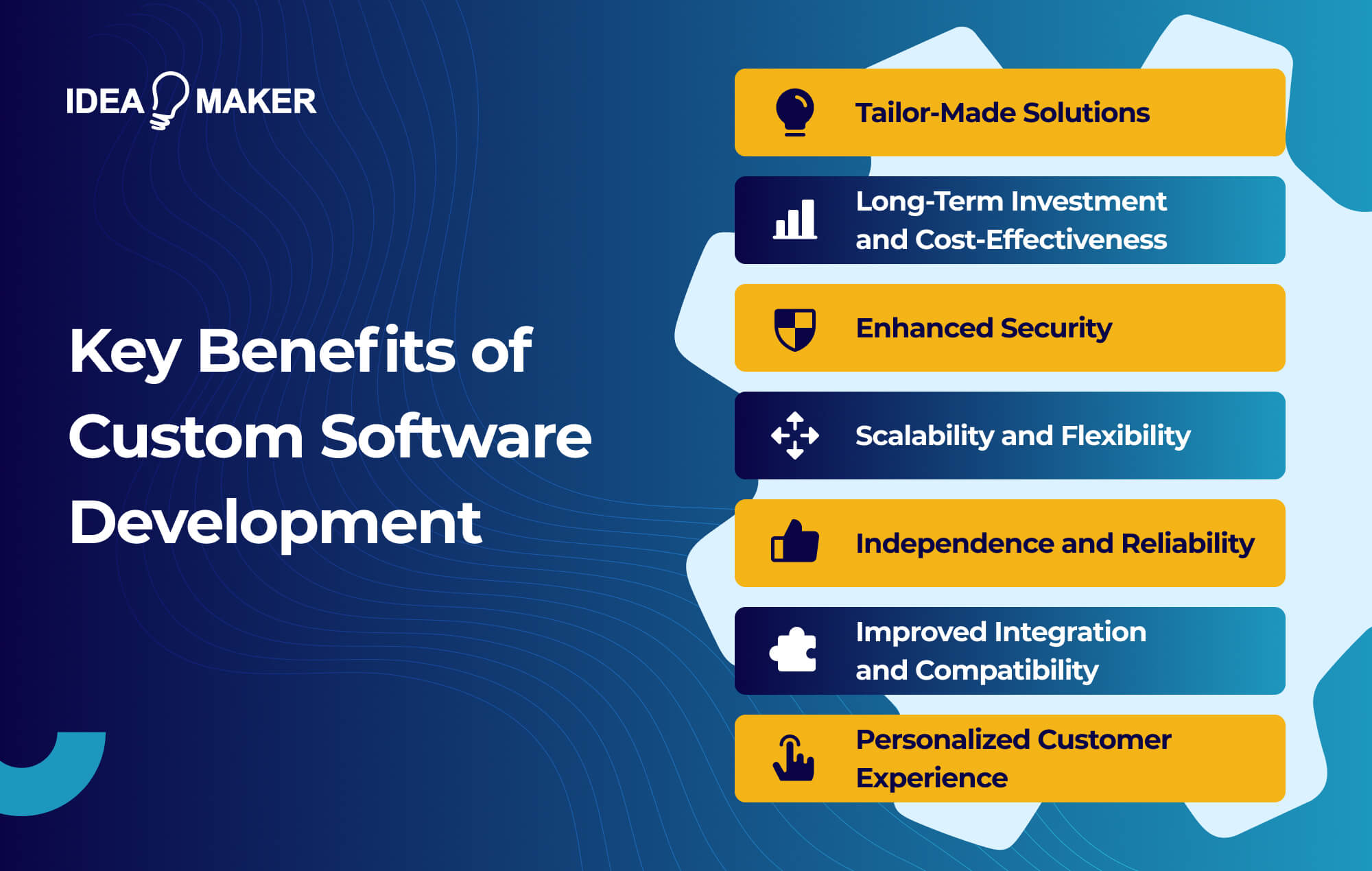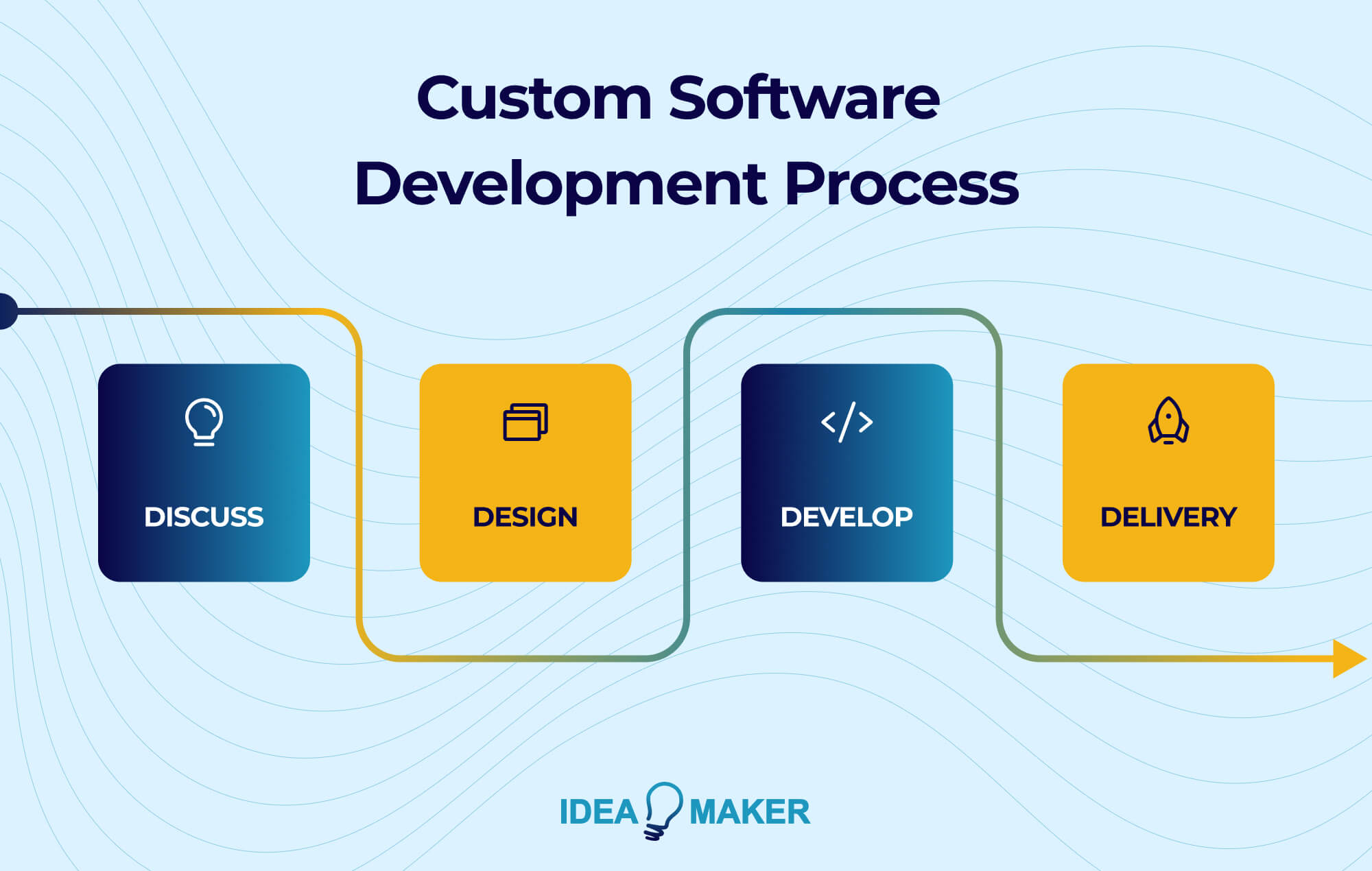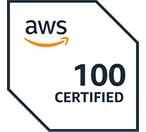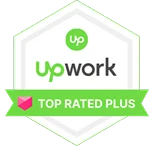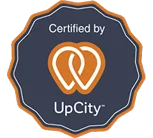Table of Contents
Custom software development has quickly become a highly sought after service among growing businesses. Custom software gives your business the edge it needs to set you apart from your competitors.
Custom software is far more effective at meeting the needs of your specific business compared to off-the-shelf products. This is because the end product is tailored to your business’s specific needs. The result is that your workflow from start to finish is enhanced with greater efficiency, security and much more.
However, when creating bespoke software, you’re likely to encounter challenges ranging from budget overruns, developmental hiccups, to choosing the right developmental partner. It is therefore important to understand the processes involved in custom software development to keep you in the driving seat and in control of your custom software development project.
This short guide explains the benefits of custom software development and provides an insight into why it could be so valuable for your growing business.
What Is Custom Software Development?
Custom software development refers to applications that are made to order with functionality geared toward specific purposes. Unlike off-the-shelf software, which caters to general industry needs, custom software development is focused on satisfying the requirements of individual businesses. This makes custom software a more powerful and effective development option, poised to streamline business processes and increase productivity.
Why Do Businesses Opt for Custom Software?
Custom software offers businesses a significant advantage over competitors using off-the-shelf applications. While off-the-shelf software may satisfy some basic business needs, custom software takes this to the next level by providing a completely tailored solution.
Businesses opt for custom software for reasons including:
- Tailor-made functionality
- High scalability
- Great cost-effectiveness
- High security level
Key Benefits of Custom Software Development
There are many advantages to building your own custom software instead of settling for an existing off-the-shelf solution. From tailor-made functionality to a personalized customer experience, here are the key benefits of custom software development.
Tailor-Made Solutions
The most compelling advantage of Custom-written software is that it’s built to meet the exact needs of your business, meaning you have perfectly tailored solutions featuring relevant functionality. For example, as a fintech company serving a niche market segment, there probably aren’t any off-the-shelf solutions that fully satisfy your needs. However, with custom software, you get the exact functionality you desire built to your business’s specific workflows.
Having software built to match your workflows and conventions ultimately ensures streamlined operations, increased productivity, and a return on investment (ROI), as you’re able to accomplish more with fewer resources. Tailor-made solutions also stand to improve the lives of your employees, making otherwise arduous and frustrating tasks simple. And, with better employee attitudes, comes higher quality work.
Long-Term Investment and Cost-Effectiveness
Though there’s a high initial cost involved with custom software development, the ROI and cost-effectiveness you’ll enjoy outweigh the development fees. For example, streamlining processes will not only allow you to accomplish more work, it will also help you save money on labor fees. Meanwhile, if you’re a customer-focused business, you can more effectively make sales, thanks to integration with your sales process.
In other words, custom software development should be viewed as an investment, not a costly financial commitment. With the right development team, custom software adds value to your business, making it a worthwhile long-term investment – not to mention the intellectual value of the software itself if it proves useful.
Enhanced Security
Software security is a major concern of both businesses and customers, as weak security can lead to sensitive information being leaked, cyber attacks, and a poor customer experience. Fortunately, custom software is built with enhanced security specifically tailored to your business’s online practices and data protection needs.
With custom-coded software, you can implement robust security measures, such as encryption, access controls, and data protection, according to your specific risks and vulnerabilities. This customized approach secures your systems in a way generic software cannot, letting you operate safely and maintain customer trust.
Scalability and Flexibility
As your business grows, the software driving your business needs to keep up with increasing demands – custom software is perfect for this. Built for both scalability and flexibility, custom-developed software allows for easy implementation of new functionality and hassle-free modifications to efficiently handle higher user loads. In fact, over 6% of businesses choose custom software thanks to its flexibility.
Alternatively, with off-the-shelf software, you’re limited to the growth options that they provide, usually requiring a greater monthly fee. What’s more, the new features you need might not be available, even after upgrading your software, leaving you to wait for the provider to act on your feedback, which isn’t guaranteed.
Independence and Reliability
With off-the-shelf software, you’re reliant on a third-party provider to release updates and maintain the software, resulting in a lack of control over your experience. Custom software, however, offers independence in terms of how you use your software and its integration with your workflows. Though certain new features may need to be handed off to your development team for creation, content management systems can be integrated to give you full control over software customizations.
In other words, custom software allows you to make changes as and when required. As a result, your business isn’t shackled to the process and decisions of a third-party vendor – instead, you’re free to implement and use your technology as you see fit.
Improved Integration and Compatibility
Being tailored specifically to your business needs and workflow means an excellent level of integration and compatibility. For example, if your business still uses legacy systems, custom software can be built to seamlessly interact with these systems in a way that off-the-shelf software cannot. Similarly, if you’re using niche systems or have particular hardware requirements, your custom software can be made to match.
Personalized Customer Experience
You know your customers better than anyone else and understand what functionality they need from your platform. If you’re an eCommerce business, for example, you might identify that your customer base requires chatbot functionality on your website. While an off-the-shelf solution may leave you wanting for this type of functionality, custom software enables you to create a customer experience fit for your unique user profile. This makes for a more positive overall experience, leading to more repeat customers and increasing your sales.
Custom Software Development Process
So, now that you’re clued in on the benefits of custom software, let’s explore what a quality custom software development process looks like. Here are the five pillars of custom software development that our team, at Idea Maker, follows.
Discuss
The discussion stage involves you and your development team talking through your software idea. At this stage, you’ll outline your software requirements, expectations, and intended use, along with key information about your business and customers. Your development team can then create an accurate and thoroughly thought-out project spec that clearly outlines all your software requirements.
Design
Based on your project spec, the development team will then design your custom software. This means creating a bare-bones interactive wireframe that highlights user interface elements and functionality, allowing you to test user flows. Once you’re happy with the proposed functionality, the team will then create a stunning visual design that matches your business’s brand.
Develop
Once you’ve approved your custom software’s design, your development team will set to work actually building your platform. This is typically the longest stage of the development process and, if your developer is worth their salt, will contain a quality assurance process, too. During development, don’t be afraid to ask for regular demos and updates of your software to give you a clear understanding of its progress.
Delivery
Finally, once the development stage is complete, your development team will deliver your project, which will look different depending on your business’s requirements. For example, a SaaS, user-focused platform release will require extra security protocols to be followed and additional server maintenance. Meanwhile, software for internal business use can be handed to you directly for implementation. This is a good stage to ask your development team about post-release support options.
How to Choose the Right Development Partner
So, now you have a solid understanding of custom software development, but what about choosing a development agency? Well, unfortunately, it’s not as easy as a Google search, as there are several components to consider when hiring a development partner These include:
- Portfolio Quality: Reviewing a development team’s portfolio helps you to determine if they have relevant experience in your industry and with developing certain types of software and functionality. Most software development teams will proudly showcase their portfolio items on their website – if not, it’s probable that they provide low-quality products.
- Client Reviews: Exploring your prospective developer’s client reviews gives you an insight into their level of service and product quality. If they are a highly rated developer, then you can likely trust them with your software development. Conversely, if they have low client satisfaction levels, it’s best to avoid them.
- Development Process: The best developers typically list their software development procedure on their website, signaling a high level of transparency. However, if it’s not available on their site, you should reach out and ask about their development process. If they still fail to provide their standard procedures, there’s a good possibility that they are inexperienced and have yet to standardize their workflows.
- Post-Release Support Options: Once your development is complete, it’s vital that your software is well-maintained to ensure a continuously smooth user experience. This means you need to hire a team that offers post-release support options.
Once you’ve reviewed and inquired about the above points, you’ll be in an excellent position to hire a reliable software development partner.
Custom Software Development From Idea Maker
If you’re ready to start your software development project, look no further than Idea Maker. We have a team of expert software developers dedicated to delivering high-quality software that elevates your business. Schedule a free consultation with us today to learn more about how our services can help you bring your project to life.
